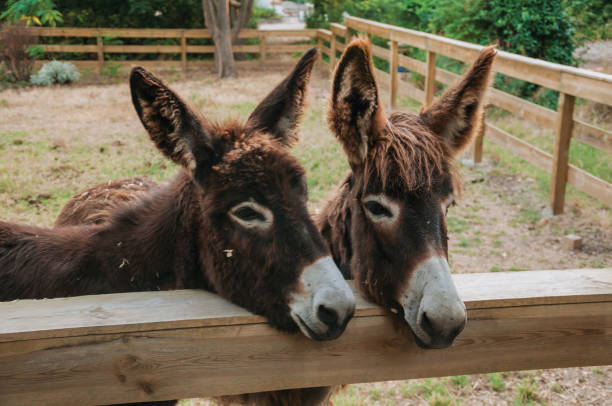Donkeys Breeding with Horses: Exploring the Hybrids and Their Characteristics
The unlikely pairing of donkeys and horses has captivated humans for centuries, resulting in fascinating hybrid offspring. While the differences between these equids are significant, their ability to interbreed produces unique animals with distinct characteristics. This article delves into the world of donkey-horse hybrids, exploring the different types, their traits, and the factors influencing their viability.
Understanding the Hybrids: Mules and Hinny
The most common result of donkey-horse breeding is the mule, a hybrid offspring of a male donkey (jack) and a female horse (mare). Conversely, a hinny is the result of a female donkey (jenny) and a male horse (stallion). While both are hybrids, they possess distinct characteristics due to the differing genetic contributions of their parents.
- Mules: Generally larger and more robust than hinnies, mules inherit a combination of strength from the donkey parent and stamina from the horse parent. Their larger size often makes them more suitable for heavier work.
- Hinnies: Typically smaller and more temperamental than mules, hinnies often display a more horse-like appearance and temperament. They are less common due to the difficulties in breeding a jenny successfully with a stallion.
Key Characteristics of Donkey-Horse Hybrids
Both mules and hinnies share some common characteristics stemming from their mixed parentage:
- Sterility: This is perhaps the most defining characteristic. Both mules and hinnies are almost universally sterile, meaning they cannot reproduce. This is due to the differing chromosome numbers between donkeys (62) and horses (64), resulting in an uneven number of chromosomes (63) in the hybrid offspring, preventing proper meiosis.
- Strength and Endurance: They often possess a unique blend of strength and endurance, inheriting the donkey's sturdy build and the horse's stamina. This makes them valuable working animals in various contexts.
- Temperament: While generally docile, the temperament can vary considerably depending on the individual animal and its parentage. Mules are often considered more even-tempered than hinnies.
- Longevity: Donkey-horse hybrids often enjoy a longer lifespan than either parent species.
Factors Influencing Hybrid Viability
The success of donkey-horse breeding is influenced by several factors:
- Breed Compatibility: The success rate varies depending on the horse and donkey breeds used. Certain breeds are more compatible than others.
- Timing and Management: Careful timing of breeding and skilled management during pregnancy and birth are crucial for successful outcomes.
- Gestational Challenges: Pregnancy in donkey-horse hybrids can be challenging, with higher risks of complications and difficulties during birth.
The Continued Significance of Donkey-Horse Hybrids
Despite their sterility, mules and hinnies have played a significant role throughout history. Their unique blend of strength, endurance, and hardiness made them invaluable working animals for centuries, particularly in agriculture and transportation. While mechanization has reduced their role in many areas, they remain appreciated for their versatility and resilience.
Conclusion
The breeding of donkeys and horses produces fascinating hybrids with unique characteristics. Understanding the differences between mules and hinnies, their shared traits, and the factors influencing breeding success enhances our appreciation of these remarkable animals. Their legacy continues, representing a testament to the adaptability and resilience of both donkey and horse lineages.
Further Reading:
Keywords: Donkey, Horse, Mule, Hinny, Hybrid, Breeding, Equids, Genetics, Sterility, Characteristics, Agriculture, Working Animals, Animal Husbandry.

